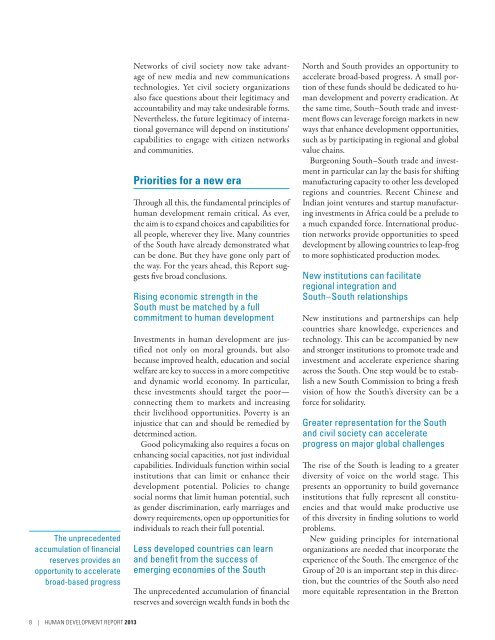E S N W
E S N W
E S N W
You also want an ePaper? Increase the reach of your titles
YUMPU automatically turns print PDFs into web optimized ePapers that Google loves.
The unprecedented<br />
accumulation of financial<br />
reserves provides an<br />
opportunity to accelerate<br />
broad-based progress<br />
8 | HUMAN DEVELOPMENT REPORT 2013<br />
Networks of civil society now take advantage<br />
of new media and new communications<br />
technologies. Yet civil society organizations<br />
also face questions about their legitimacy and<br />
accountability and may take undesirable forms.<br />
Nevertheless, the future legitimacy of international<br />
governance will depend on institutions’<br />
capabilities to engage with citizen networks<br />
and communities.<br />
Priorities for a new era<br />
Through all this, the fundamental principles of<br />
human development remain critical. As ever,<br />
the aim is to expand choices and capabilities for<br />
all people, wherever they live. Many countries<br />
of the South have already demonstrated what<br />
can be done. But they have gone only part of<br />
the way. For the years ahead, this Report suggests<br />
five broad conclusions.<br />
Rising economic strength in the<br />
South must be matched by a full<br />
commitment to human development<br />
Investments in human development are justified<br />
not only on moral grounds, but also<br />
because improved health, education and social<br />
welfare are key to success in a more competitive<br />
and dynamic world economy. In particular,<br />
these investments should target the poor—<br />
connecting them to markets and increasing<br />
their livelihood opportunities. Poverty is an<br />
injustice that can and should be remedied by<br />
determined action.<br />
Good policymaking also requires a focus on<br />
enhancing social capacities, not just individual<br />
capabilities. Individuals function within social<br />
institutions that can limit or enhance their<br />
development potential. Policies to change<br />
social norms that limit human potential, such<br />
as gender discrimination, early marriages and<br />
dowry requirements, open up opportunities for<br />
individuals to reach their full potential.<br />
Less developed countries can learn<br />
and benefit from the success of<br />
emerging economies of the South<br />
The unprecedented accumulation of financial<br />
reserves and sovereign wealth funds in both the<br />
North and South provides an opportunity to<br />
accelerate broad-based progress. A small portion<br />
of these funds should be dedicated to human<br />
development and poverty eradication. At<br />
the same time, South–South trade and investment<br />
flows can leverage foreign markets in new<br />
ways that enhance development opportunities,<br />
such as by participating in regional and global<br />
value chains.<br />
Burgeoning South–South trade and investment<br />
in particular can lay the basis for shifting<br />
manufacturing capacity to other less developed<br />
regions and countries. Recent Chinese and<br />
Indian joint ventures and startup manufacturing<br />
investments in Africa could be a prelude to<br />
a much expanded force. International production<br />
networks provide opportunities to speed<br />
development by allowing countries to leap-frog<br />
to more sophisticated production modes.<br />
New institutions can facilitate<br />
regional integration and<br />
South–South relationships<br />
New institutions and partnerships can help<br />
countries share knowledge, experiences and<br />
technology. This can be accompanied by new<br />
and stronger institutions to promote trade and<br />
investment and accelerate experience sharing<br />
across the South. One step would be to establish<br />
a new South Commission to bring a fresh<br />
vision of how the South’s diversity can be a<br />
force for solidarity.<br />
Greater representation for the South<br />
and civil society can accelerate<br />
progress on major global challenges<br />
The rise of the South is leading to a greater<br />
diversity of voice on the world stage. This<br />
presents an opportunity to build governance<br />
institutions that fully represent all constituencies<br />
and that would make productive use<br />
of this diversity in finding solutions to world<br />
problems.<br />
New guiding principles for international<br />
organizations are needed that incorporate the<br />
experience of the South. The emergence of the<br />
Group of 20 is an important step in this direction,<br />
but the countries of the South also need<br />
more equitable representation in the Bretton


